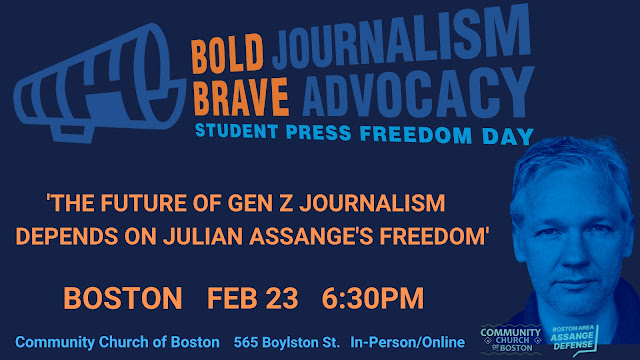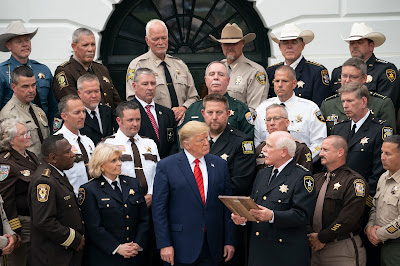The Massachusetts Supreme Judicial Court two weeks ago struck down a town policy purporting to require civility in public meetings. The town policy resembles attempts to restrict academic freedom.
 |
Board meeting, via Southborough Access Media video
(Kolenda at center).
|
'Civility' in Politics
In December 2018,
Southborough, Massachusetts, resident Louise Barron took advantage of a public comment period at a town board meeting to call out board members on fiscal policy and, ironically, compliance with state open meetings law. Though not obliged to, board members responded. The discussion became heated, resulting in Barron calling one selectman, Daniel Kolenda, "a Hitler," and Kolenda abruptly ending the comment period and expelling Barron. (The meeting is
on YouTube (cued). Read more
at Wicked Local.)
Board policy provides for an open public comment period for extra-agenda items with this admonition:
All remarks and dialogue in public meetings must be respectful and courteous, free of rude, personal or slanderous remarks. Inappropriate language and/or shouting will not be tolerated. Furthermore, no person may offer comment without permission of the [c]hair, and all persons shall, at the request of the [c]hair, be silent. No person shall disrupt the proceedings of a meeting.
Barron challenged the policy and her expulsion under the freedom of assembly and freedom of speech provisions of the 1780 Massachusetts Declaration of Rights, articles 19 and 16, respectively. Barron forewent challenge under the younger (1791) First Amendment to the U.S. Constitution to keep the case in state court.
And just as well. The Massachusetts Declaration is a revered document in its own right in American history and global human rights, and the Massachusetts Supreme Judicial Court has not hesitated to construe its provisions as more protective of civil rights than the federal standard. Indeed, for many years, well before I came to work in Massachusetts, I taught a public seminar on the First Amendment for the Freedom of Information Foundation of Texas and used the Massachusetts Declaration to demonstrate the close connection of FOI and assembly.
Article 19 provides, "The people have a right, in an orderly and peaceable manner, to assemble to consult upon the common good; give instructions to their representatives, and to request of the legislative body, by the way of addresses, petitions, or remonstrances, redress of the wrongs done them, and of the grievances they suffer."
In teaching freedom of information law, I often shorthand the constitutional context of access law as the "flip side of the coin" of the First Amendment. The idea is that the freedom of speech is meaningless, especially in the core protection of political expression, if one does not know the facts to speak about.
The coin characterization is useful, but it's not entirely accurate. The First Amendment recognition of assembly as ancillary to expression aptly indicates an interrelationship that is more an intertwining than a duality.
 |
Board meeting, via Southborough Access Media video
(Barron at right). |
In the opinion of the court, Justice
Scott L. Kafker recounted Article 19's "illustrious" history.
The provision also has a distinct, identifiable history and a close connection to public participation in town government that is uniquely informative in this case. ... [Article] 19 reflects the lessons and the spirit of the American Revolution. The assembly provision arose out of fierce opposition to governmental authority, and it was designed to protect such opposition, even if it was rude, personal, and disrespectful to public figures, as the colonists eventually were to the king and his representatives in Massachusetts.
Our interpretation of the text, history, and purpose of art. 19 is further informed by the words and actions of Samuel and John Adams, who not only theorized and commented upon the right, but were historic actors well versed in its application during the revolutionary period, particularly in the towns. Both Adams cousins emphasized in their correspondence and their actions the importance of the right to assemble.... Samuel Adams wielded it to great effect in his attempt to "procure a Redress of Grievances" when the British governor of the colony attempted to exercise control over assemblies after the Boston Massacre....
More philosophically, John Adams explained that the right of assembly was a most important principle and institution of self-government, as it allowed "[every] Man, high and low ... [to speak his senti]ments of public Affairs.".... Town inhabitants, he wrote, "are invested with ... the right to assemble, whenever they are summoned by their selectmen, in their town halls, there to deliberate upon the public affairs of the town." .... "The consequences" of the right of assembly, in Adams's words, were that "the inhabitants ... acquired ... the habit of discussing, of deliberating, and of judging of public affairs," and thus, "it was in these assemblies of towns ... that the sentiments of the people were formed ... and their resolutions were taken from the beginning to the end of the disputes ... with Great Britain." .... Alexis de Tocqueville made a similar point in Democracy in America: "Town-meetings are to liberty what primary schools are to science; they bring it within the people's reach, they teach men how to use and how to enjoy it." ....
The court had little difficulty concluding that the town policy thus ran afoul of article 19.
There was nothing respectful or courteous about the public assemblies of the revolutionary period. There was also much that was rude and personal, especially when it was directed at the representatives of the king and the king himself.
The court furthermore held the town policy overbroad and vague in violation of the article 16 freedom of speech. The case did not require the court to determine whether the First Amendment public forum doctrine applies to article 16 problems, the opinion explained. Massachusetts precedents already establish that content-based restrictions of political speech are subject to strict scrutiny. Worse, the court reasoned, the policy is viewpoint based, as it allows "polite[] praise[]" of public officials while condemning "rude[] or disrespectful[] critici[sm]."
Well reasoned as it is, the decision in Barron v. Kolenda, No. SJC-13284 (Mar. 7, 2023), does not break new ground in freedom of speech, even in Massachusetts law. And the case has been well reported with commentary, for example by J.D. Tuccille for Reason ("Let Massholes Be Massholes, Says Bay State's High Court"), and by Pioneer Legal, The New York Times, and the Brennan Center. What enticed me to write about the case is the likeness of the civility code to efforts to extinguish academic freedom.
'Civility' in the Workplace
The go-to code word on American college campuses to curb faculty freedom has been "collegiality." Introducing a 2016 report, the AAUP explained:
In recent years, Committee A has become aware of an increasing tendency
on the part not only of administrations and governing boards but also
of faculty members serving in such roles as department chairs or as
members of promotion and tenure committees to add a fourth criterion in
faculty evaluation: "collegiality." For the reasons set forth in this
statement, we view this development as highly unfortunate, and we
believe that it should be discouraged....
.... Historically, "collegiality" has not infrequently been associated with
ensuring homogeneity and hence with practices that exclude persons on
the basis of their difference from a perceived norm. The invocation of "collegiality" may also threaten academic freedom. In the heat of
important decisions regarding promotion or tenure, as well as
other matters involving such traditional areas of faculty responsibility
as curriculum or academic hiring, collegiality may be confused with the
expectation that a faculty member display "enthusiasm" or "dedication,"
evince "a constructive attitude" that will "foster harmony," or display
an excessive deference to administrative or faculty decisions where
these may require reasoned discussion. Such expectations are flatly
contrary to elementary principles of academic freedom, which protect a
faculty member’s right to dissent from the judgments of colleagues and
administrators.
I witnessed this problem in action in those "recent years." "Collegiality" as an excuse to demand conformity was key in prompting me to write and speak in 2009 and 2010 about the importance of what I termed "penumbral academic freedom."
The problem has only worsened. In fact, I see the "collegiality" expectation as a piece of the broader problem of corporate ideology that insists on everyone being a "team player." That's the coded language designed to alienate workers who hesitate to take on extra duties or to give up personal time without fair compensation. Too long in coming, the "quiet quitting" movement is a direct response to this self-serving worldview.
Though "team speak" is not a specially academic problem, the ever more corporatized public university embraces the jargon. Routinely, I hear my work for a public entity described as "public service." The characterization is invariably paired with a demand that I take on some additional responsibility with no more, if not with less, compensation, and certainly with less compensation than a similarly skilled colleague at a private institution.
The rhetoric is exhausting. I'm not on your "team." The faculty is not my football side. The office is not my church. The institutional "mission" is not my creed. Rather, I do a job. I get paid for the job. Quid pro quo. Often, I enjoy my work, and sometimes, I'm good at it. But it's work. Then (even when the switch is merely virtual) I go home. Where I don't work for anyone else. Where I have a family and a life. Where I hope to win the lottery and quit my job.
That arrangement should be a source of pride, not shame. A public institution performing a public service is no less laudable because its staff is paid rather than volunteer. When administrators, especially handsomely compensated deans and chancellors, break out the "public service" rhetoric, hat in hand, I want to ask why they cash their paychecks, if they're so committed to "public service."
Just as I digested the court's Barron decision and commentary last week, Professor Robert Steinbuch, a (genuinely collegial) colleague at another public law school, told me about a proposed amendment to his school's selection criteria for distinguished professorships.
Apparently, there was dissatisfaction by some faculty, I assume for the very reasons the AAUP warned, that "collegiality" was an express factor in the assessment. Thus, the law school faculty development committee proposed changes including the following (red-ink deletions and additions as in original).
In awarding named professorships, the Dean shall consider criteria in addition to a candidate's meritorious work in their particular field, including but not limited to donor specifications associated with the title, the overall mission of the law school, and continued excellence in scholarship, teaching, service, civility, and respect and collegiality as outlined in the Bowen Faculty Handbook, and established University policy, or the Association of American Law Schools Best Practices.
....
III. SERVICE & COLLEGIALITY
....
In the space provided below, please describe any additional information you wish to provide reflecting exemplary service rendered in the spirit of civility, respect collegiality and collaboration at the law school and the university level and wider recognition at the national or international level.
....
Self-Assessment: Using the categories of scholarship, teaching, service, civility, and respect and collegiality in this Application, in the space provided below, please provide a candid assessment of how you would represent this Named Professorship while you held the award.
I suppose that any candidate selected for a distinguished professorship at this public law school, like anyone commenting on the performance of public officials in Southborough, Massachusetts, before Barron, "must be respectful and courteous" and refrain from the "rude" and "personal." Faculty governance is all well and good, as long as no one is offended.
Let the revolution be quelled.












.jpg)


